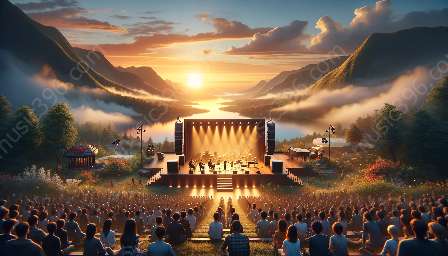Introduction: The Complexity of Religious and Cultural Event Licensing
Religious and cultural events play a significant role in the fabric of society, providing a platform for individuals and communities to express their faith, connections to tradition, and cultural heritage. However, these events are often intrinsically linked to aspects of intellectual property, particularly with regards to music, and are subject to a complex web of legal and cultural considerations.
Understanding Music Licensing and Copyright Law
Before delving into the specific nuances of religious and cultural event licensing, it is important to have a foundational understanding of music licensing and copyright law. Music licensing involves the process of granting permissions for the use of copyrighted music, typically for commercial or public purposes. Copyright law, on the other hand, governs the exclusive rights granted to the creators of original musical works, providing legal protection against unauthorized use or reproduction.
Music Licensing in Religious and Cultural Events
Religious and cultural events often incorporate music as a fundamental component of their ceremonies and celebrations. Whether it be traditional hymns, ceremonial chants, or cultural music, the utilization of musical compositions in these events necessitates proper licensing to ensure compliance with copyright law. Event organizers must navigate the intricacies of music licensing to secure the appropriate permissions for the public performance or synchronization of music.
Public Performance Licensing
Public performance licensing is a crucial consideration for religious and cultural events where music is publicly performed. This type of license grants the right to perform a copyrighted musical work in a public setting, such as churches, temples, or cultural venues. Event organizers must obtain the necessary licenses from performing rights organizations (PROs) or directly from music publishers to ensure legal compliance.
Synchronization Licensing
In the context of cultural events that involve audiovisual presentations, such as dance performances, theatrical productions, or multimedia displays, synchronization licensing comes into play. This type of license is required when copyrighted music is synchronized with visual content. Event organizers must secure synchronization licenses from music publishers or copyright holders to avoid infringing on the exclusive rights associated with synchronization of music.
Linking Religious and Cultural Significance with Legal Obligations
Religious and cultural event licensing entails the delicate balance of respecting the significance of traditional music and rituals while adhering to legal obligations related to music rights and copyright. The interplay between cultural significance and legal responsibilities necessitates nuanced approaches that acknowledge the unique cultural and religious aspects of the events while upholding legal compliance.
Cultural Heritage Preservation
Many cultural events serve as vehicles for preserving and showcasing the rich heritage and traditions of diverse communities. The music and performances associated with these events are often deeply rooted in cultural history and symbolic meaning. As such, it is imperative to safeguard the cultural integrity of the musical repertoire and rituals by ensuring that the necessary permissions and licenses are obtained without compromising the authenticity and significance of the cultural expressions.
Respect for Copyright and Intellectual Property
Simultaneously, event organizers and participants must demonstrate respect for the copyright and intellectual property rights associated with the music used in religious and cultural events. Through adherence to copyright law and music licensing requirements, these stakeholders contribute to the sustainability of creative industries and the protection of artistic expressions, while recognizing the value of music as a form of intellectual property.
Facilitating the Dialogue between Copyright Holders and Cultural Practitioners
The intersection of religious and cultural event licensing with copyright law and music licensing also calls for mechanisms that foster constructive dialogue and collaboration between copyright holders and cultural practitioners. Encouraging mutual understanding and respect can lead to equitable practices that uphold the rights of creators and performers while acknowledging the cultural significance of the music employed in religious and cultural events.
Customized Licensing Agreements
Customized licensing agreements present an avenue for aligning the requirements of religious and cultural event organizers with the rights and interests of copyright holders. By facilitating discussions and negotiations, customized licensing agreements can cater to the specific needs of religious and cultural events, thereby enabling the lawful use of music while honoring the traditional and ceremonial context in which it is employed.
Community Engagement Initiatives
Engaging with local communities, cultural organizations, and representative bodies can foster a collaborative environment that values the contributions of cultural practitioners and acknowledges the significance of religious and traditional music. Community engagement initiatives can promote awareness of licensing obligations and copyright compliance while cultivating an environment that supports the continuation of cultural traditions and artistic expressions.
Conclusion: Embracing Legal Compliance and Cultural Enrichment
Religious and cultural event licensing stands as a multifaceted domain that intertwines legal considerations with the preservation and propagation of cultural and religious heritages. By understanding the complexities of music licensing and copyright law within the context of religious and cultural events, stakeholders can navigate the intricacies of licensing requirements while upholding the richness and significance of traditional music and rituals.


